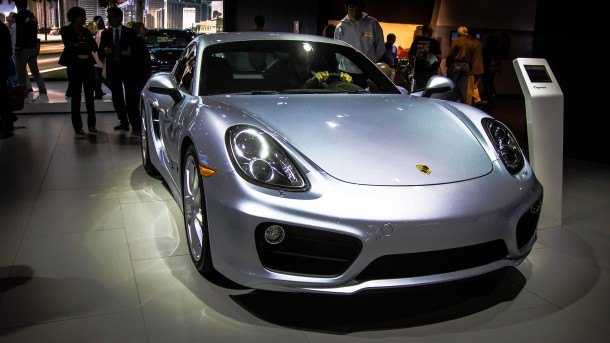Wait a Second Before You Invest Any More Energy in J.D. Power

There’s a considerable need for independent research and analysis, especially when it comes to cars.
But I have something to tell you about J.D. Power and Associate’s annual Automotive Performance, Execution and Layout study: it’s remarkably flawed.
The annual survey — alongside most other annual surveys — serves as a stump from which automakers proudly proclaim, “We’re the best, see? These guys just said so.”
But the APEAL survey, alongside J.D. Power and Associate’s Initial Quality Survey, give a distorted glimpse at the reality of buying a car.
They have no perception of cost. And that’s a big, big problem.
If you could afford a new Porsche, how satisfied with that purchase will you be in 90 days, when seemingly nothing expensive has gone wrong? What about 4 years later when warranties start to wane, and regular maintenance includes parts like a notoriously fussy internal oil separator that runs $2,000 to fix? Rear calipers that run $3,000? Or a $523.50 oil change? That Porsche you purchased may not be all that appealing anymore, I’m guessing, regardless of the awards J.D. Power can heap upon the company.
(Even further, I’m guessing the buyer who can drop $100,000 on a sports car is the type of buyer that can ditch that car for another sports car in three years and report that they’re pleased as punch again with the purchase.)
Meanwhile, if your bought-on-a-budget Toyota Corolla lugged your soul-crushing commute to work at 7 a.m., how stoked are you on that purchase 90 days — or even 90 minutes — after walking off the lot? I bought a new toaster last week and I wasn’t jazzed about it before I checked out at the register.
There needs to be a dose of reality when viewing these surveys. Mercedes-Benz, Audi, Jaguar and Land Rover all topped the list of initial appeal, but also topped Forbes’ list of most expensive cars to fix.
It makes sense. Really expensive cars are really nice. Really nice, expensive cars are also really complicated. I know, because I drive them all the time. An S-Class is more appealing than a Toyota Yaris because Mercedes-Benz makes really nice cars that cost a lot of money.
To say that Porsches have more appeal than Subarus is a no brainer; I don’t need 77 attributes with a verified score out of 1,000 to say that a big house with a rollercoaster looks better than a small house with a leaking basement. But I can only afford one of those.
But I do need a study that reliably and logically presents their ownership, maintenance, resale proportional to budget. Average MSRP and cost of ownership don’t factor into the J.D. Power survey.
That’s not to say Porsche, Mercedes-Benz, Jaguar or Audi make bad cars. J.D. Power just makes a narrow study that’s contorted way beyond its intent or measure.

More by Aaron Cole
Latest Car Reviews
Read moreLatest Product Reviews
Read moreRecent Comments
- ToolGuy Good for them, good for me.
- Tassos While I have been a very satisfied Accord Coupe and CIvic Hatch (both 5-speed) owner for decades (1994-2017 and 1991-2016 respectively), Honda has made a ton of errors later.Its EVs are GM clones. That alone is sufficient for them to sink like a stone. They will bleed billions, and will take them from the billions they make of the Civic, Accord, CRV and Pilot.Its other EVs will be overpriced as most Hondas, and few will buy them. I'd put my money on TOyota and his Hybrid and Plug-in strategy, until breaktrhus significantly improve EVs price and ease of use, so that anybody can have an EV as one's sole car.
- ToolGuy Good for Honda, good for Canada.Bad for Ohio, how could my President let this happen? lol
- Tassos A terrible bargain, as are all of Tim's finds, unless they can be had at 1/2 or 1/5th the asking price.For this fugly pig, I would not buy it at any price. My time is too valuable to flip ugly Mitsus.FOr those who know these models, is that silly spoiler in the trunk really functional? And is its size the best for optimizing performance? Really? Why do we never see a GTI or other "hot hatches' and poor man's M3s similarly fitted? Is the EVO trying to pose as a short and fat 70s ROadrunner?Beep beep!
- Carson D Even Tesla can't make money on EVs anymore. There are far too many being produced, and nowhere near enough people who will settle for one voluntarily. Command economies produce these results. Anyone who thinks that they're smarter than a free market at allocating resources has already revealed that they are not.


































Comments
Join the conversation
The more you spend, and the smarter you think you are, the more likely you are to answer survey questions to validate your expenditure and self-perception. "I made a great decision and spent my money wisely!"
"You’re all hot and bothered about something that you know nothing about." Wouldn't be the first time. Or maybe that's your way of saying I win? ;) But if you're talking about testing being the know-nothing thing, I'm making a pretty big-picture point here. If someone pays $40,000 for a Pilot with, among other things, Honda Sensing safety features, are they going to have as much underlying/subconscious/you-name-it incentive to answer positively as someone who paid twice as much for essentially the same vehicle? And if it's simply a laundry list and the vehicles that have the most checked boxes wins, what's the point of a survey since you seem to be saying the best equipped vehicle will win? It's like when you read "$30 million study determines that men like breasts"....